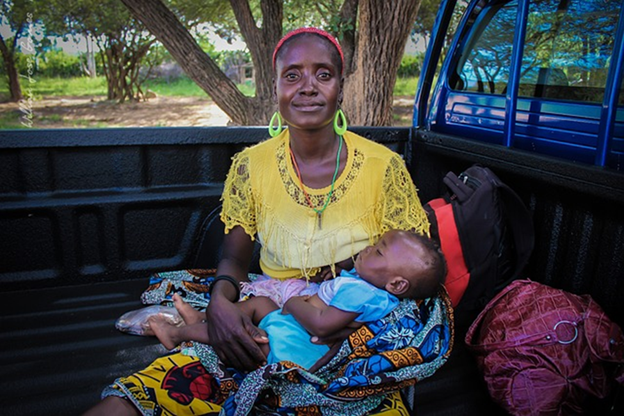February 2025 African Proverb of the Month Having white hair is a broom Sukuma (Tanzania) Proverb
 |
Ng`wilu wa nzwili cheyo. (Sukuma) Weupe wa nywele ni ufagio. (Swahili) Avoir des cheveux blancs est un balai. (French) Having white hair is a broom. (English) |
Sukuma(Tanzania) Proverb
Background, Meaning and Everyday Use
The origin of this proverb concerns a woman who existed in a certain village in Sukumaland, Tanzania. She had long, grey hair. She was beautiful, clean and always dressed properly. She did not want to see dirty environment around her. She took care of herself (her body), her family, others, her house and the surrounding area in general. She was kind, humble, welcoming, and cheerful with a good heart and behavior. To cut the story short, she lived well with everybody in her village. The husband was happy and proud to have such a wife. He was praised for marrying such a caring wife. She loved and cared for herself and others. She was always shining.
Every villager admired this woman because she had qualities of a good woman/mother. She taught her children to love and care for themselves and for others and foremost to live as one union in sisterhood/brotherhood. She raised her children by teaching good manners and values like listening and respecting elders. Her children became good examples in the society. She was a good example to all women in her village. The Sukuma use this proverb Ng’wilu wa nzwili cheyo to teach people in the society especially women and girls that they have to be beautiful not only outside their bodies but also inside their hearts. When the woman is good hearted the whole society will be taught by her goodness because she transmits these values to children. In Swahili there is a proverb similar to this — uzuri wa Mwanamke tabia” — translated as the beauty of a woman is her behavior.
This proverb teaches people especially women about goodness and taking care of the house and environment and knowing to teach those good values to children as mothers in order that the family and society at large may live happy and fulfilled life where there is harmony, love and care for each other.
Biblical Parallels
Song of Songs 6: 4-5: “You are as beautiful as Tirzah, my darling, as lovely as Jerusalem, as majestic as troops with banners. Turn your eyes from me; they overwhelm me. Your hair is like a flock of goats descending from Gilead.”
Song of Songs 4: 1-2: “How beautiful you are, my darling! Oh, how beautiful! Your eyes behind your veil are doves. Your hair is like a flock of goats descending from the hills of Gilead. Your teeth are like a flock of sheep just shorn, coming up from the washing. Each has its twin; not one of them is alone.”
Luke 1:26-38: “In the sixth month of Elizabeth`s pregnancy, God sent the angel Gabriel to Nazareth, a town in Galilee, to a virgin pledged to be married to a man named Joseph, a descendant of David. The virgin`s name was Mary. The angel went to her and said, “Greetings, you who are highly favored! The Lord is with you. “Mary was greatly troubled at his words and wondered what kind of greeting this might be. But the angel said to her, “Do not be afraid Mary; you have found favor with God. You will conceive and give birth to a son, and you are to call him Jesus. He will be great and will be called the Son of the Most High. The Lord God will give him the throne of his father David, and he will reign over Jacob`s descendants forever; his kingdom will never end.” “How will this be,” Mary asked the angel, “since I am virgin?” The angel answered, “The Holy Spirit will come on you, and the power of the Most High will overshadow you. So the holy one to be born will be called the Son of God…” I am the Lord`s servant,” Mary answered. “May your word to me be fulfilled.” Then the angel left her.”

Contemporary Use And Religious Application
This Sukuma proverb invites people not only to take care of themselves, their body or appearance but also to have good behavior and good heart. That is to be clean outside the body and inside the body (heart). When they are good to themselves and their fellow human beings (neighbors, family members) they will live a happy life where love, peace and brotherhood/sisterhood is experienced. It is when they live in love with oneself and with others as Jesus states in the commandment of love that they are really serving God.
It encourages and teaches them that when you have good behavior and good heart God can use them as an instruments to spread the Good News in our family and in our Small Christian Communities by our examples of love and care. When we live Christian values of love, respect, care for the others especially the poor and needy, obedience to our elders and parents, or strive for unite, peace and justice in our homes and the society we can draw many people to become disciples of Jesus. The Virgin Mary is a good example of God’s instrument that God used to bring salvation to the whole world because she has a good heart. She loved God and her neighbors.
This is a good African Proverb to use during this 2025 Jubilee Year in the Catholic Church on the theme “Pilgrims of Hope.”
Text by:
Father John Mitumba, MAfr
Missionaries of Africa (White Fathers)
Kinshasha, Democratic Republic of the Congo (DRC)
Cellphone : +243 822 223 161
E-Mail: mitumbaj@gmail.com
Photos by:
Father Zakaria Kashinje, OSA
Dar es Salaam, Tanzania
Cellphones:
+255-756-887787 Vodacom
+255-717-3337787 Tigo
+255-786-337787 Airtel
Email: zkashinje@gmail.com
zkashinje@yahoo.co.uk
